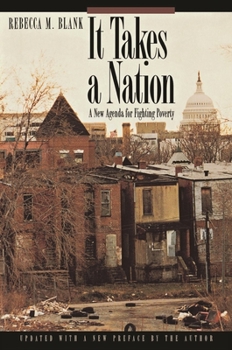It Takes a Nation: A New Agenda for Fighting Poverty - Updated Edition
Select Format
Select Condition 
Book Overview
As Americans experiment with dismantling the nation's welfare system, clich s and slogans proliferate, ranging from charges that the poor are simply lazy to claims that existing antipoverty programs have failed completely. In this impeccably researched book, Rebecca Blank provides the definitive antidote to the scapegoating, guesswork, and outright misinformation of today's welfare debates. Demonstrating that government aid has been far more effective...
Format:Paperback
Language:English
ISBN:0691004013
ISBN13:9780691004013
Release Date:September 1998
Publisher:Princeton University Press
Length:368 Pages
Weight:0.35 lbs.
Dimensions:0.8" x 6.1" x 9.1"
Customer Reviews
3 ratings
Thought provoking
Published by Thriftbooks.com User , 23 years ago
This is a book that is full of facts. It analyses the studies of poverty that have occurred over the last 30 years. It concludes that a lot of popular views of poverty are wrong. The popular perceptions are that poverty is ghetto based, it is behavioral and untractable. Some groups in America tend to use stereotypes as a means of arguing for the reduction of welfare payments. These include the assertion that a large number of poor people are black single mothers. The decision to become a single mother in a time of freely available birth control and abortion suggests that the mother has made a considered decision to become pregnant. The book examines the nature of poverty. The material is statistical but it breaks down a number of stereotypes. Poverty is far more diverse with poor people living in a range of settings and neighborhoods. A high percentage of the poor work poverty is due to a range of factors. The inability to obtain employment, the dependence on part time employment or factors which prevent the ability to obtain an income such as age or having the sole responsibility for raising children. Some social programs have been successful in reducing poverty amongst the aged.In previous years it has been thought that economic growth has decreased poverty. This certainly was the case after the second world war and in the 1960's. The reason for this was the combination of increased work hours and an increase in wages at all levels. Since 1988 however this has not occurred. Poverty has increased despite economic growth. The reason for that is the decline in wage levels and availability of the jobs usually occupied by the poor. In 1994 the unemployment rate for people with a University qualification was 3% the rate for high school drop outs was 14% and for Afro American high school drop outs was 20%. Between 1979 and 1993 the wages for high school drop outs decreased by 22%. The situation is however worse for women who earn about 75% of what an unskilled male would earn. The problem of poverty is thus something which will be likely to occur despite what happens in the general economy.The writer indicates that the amount spent on welfare by the Federal Government is low about 8% of the budget with Medicare contributing another 6%. These programs have been at a stable level since the 1980's. America spends far less on welfare than countries of comparative wealth. The author speculates that this is due to the nature of American history. The groups that have been poor have been recent immigrant arrivals or Afro-Americans. Rather than empathizing with such groups the broad population usually thinks that the problems of poverty relate to issues of laziness or other aspects relating to the different culture of the most recently arrived group. An examination of the programs to date shows that they are generally reasonably successful and effective. In the 1960's pockets of Americans suffered from actual malnutrition. The food stamp program has solved t
Comprehensive new anti-poverty agenda
Published by Thriftbooks.com User , 24 years ago
In a recent issue of Radical Middle, a newsletter published by Mark Satin, the lead article was entitled "Left, right and evangelicals hammer our holistic anti-poverty agenda". This book was one of three that was most highly recommended."Today, for the first time in three decades, comprehensive new anti-poverty agendas are being proposed by prominent scholars and civic leaders. And they're about as different from the "entitlements"-based agendas of the Sixties as can be imagined."They're infinitely more sensitive to the totality of the problems of the poor."They involve a lot more entities than the Federal government."They're more supervisory (some might say "paternalistic" or "maternalistic"), but at the same time less bureaucratic, more responsive to individual poor people's unique situations."And they're not just coming from one end of the political spectrum! OF the three most promising agendas from the last three years, one is from a leading radical-liberal scholar, Rebecca M. Blank, former director of the Joint Center for Poverty Research at Northwestern University (this book)"Another is from a leading conservative scholar, Lawrence M Mead -- one of the token conservatives at New York University -- working in colloaboration with the Brookiings Institution (Mead, ed., The New Paternalism: Supervisory Approaches to Poverty, 1997)"And the third is from a thrologian whose politics can best be described as "radical middle" -- Ronald J. Sider, President of Evangelicals for Social Action. Sider, who's lived, taught, and ministered in poor and working class neighborhoods in Philadelphia for 30 years, got former Nixon aide Chuck Colson to write a foreword to the agenda. (Just Generosity: A New Vision for Overcoming Poverty in America, 1999)"-- from Radical Middle, Center for Visionary Law, Business and Public Policy, Inc. PO Box 57100 Washington, DC
Comprehensive and balanced
Published by Thriftbooks.com User , 25 years ago
This is one of the best books which I have ever read. This is very balanced and comprehensive. She emphasized the diversity of the domestic poverty problems. She mentioned not only policies or economics but also urban structure, the features of welfare institutions and so on. This is well-organazied and easy to understand. I recommend all people who are interested in the domestic poverty problems to read this book.






